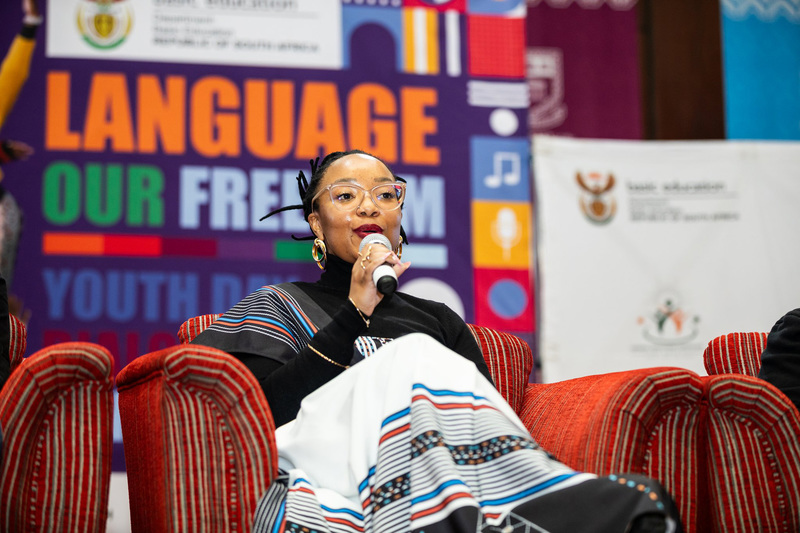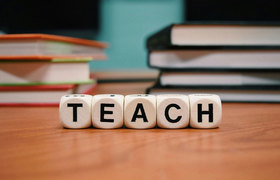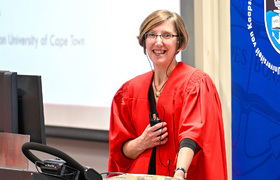Creating greater access to children’s books
24 June 2025 | Story Kamva Somdyala. Photo Supplied. Read time 4 min.
Four University of Cape Town (UCT) alumni responded to the alarming literacy levels in the country by creating a repository of children’s books – TAQA – in videobook format which integrates the written, illustrated, and audio components of a book to create engaging children’s stories with the intention of helping children learn how to read.
The Progress in International Reading Literacy Study (PIRLS), which noted that more than 80% of children in Grade 4 cannot read for meaning accelerated the need to find eclectic ways of disseminating knowledge through reading. TAQA releases their various books in the 11 official South African spoken languages, while the South African Sign Language (SASL) collection is in the works.
On 16 June, TAQA and its stakeholders, which include the Department of Basic Education (DBE), hosted the “Language our Freedom” gathering, an event intended to advance the conversation around Mother Tongue-based Bilingual Education (MTbBE). Also present at the event was UCT’s deputy vice-chancellor for Transformation, Student Affairs and Social Responsiveness, Professor Elelwani Ramugondo, who moderated a panel discussion.
“Language and multilingualism are a superpower and not a hinderance.”
Speaking to UCT News after the day’s proceedings, TAQA’s co-founder, chief of strategy and technology, and chemical engineering graduate, Tsepang Khoboko, said it was the UCT experience which aided their mission to contribute to the power of stories as a liberating force in the literacy challenges the country faces.
“We were UCT students at a time when it was politically charged with Rhodes Must Fall and Fees Must Fall and that was the start, for a lot of us, of conversations around decoloniality and what it looks like. We took the angle of language because if you can decolonise using language as a tool, you are almost there in terms of the work of decolonisation. I too have a role to play in advancing the country,” Khoboko said.
Language and technology
“We, four young black South Africans, thought to start an organisation which seeks to preserve languages and to make literacy accessible in people’s mother tongue. We’ve carried the baton, and we are running with it, and I think it’s significant, given the context of our history. Once it was established that English is not the language of intelligence, it sparked a conversation about what space do our languages hold and what do they mean to us,” she explained. “That’s when we explored the fact that language is identity and heritage. That way, people can fully express themselves, understand and grasp knowledge in their home language. Language and multilingualism are a superpower and not a hinderance. The DBE is tasked with making our schools multilingual.”
TAQA is anchored on the knowledge that languages hold the spirit, imagination, culture, and history of a people. It is therefore critical that they take active steps to use and celebrate African home languages, to preserve and grow languages.
“Language and multilingualism are a superpower and not a hinderance.”
“What we normally say at TAQA is that we are making knowledge and literacy accessible through language and technology, because the other side of inaccessibility is about what a parent does if they want to expose their child to literacy but also literacy in their home language and one of the problems we are solving is making that conveniently accessible and that’s why we have our digital library living in devices we access every day,” Khoboko said.
“I always say I love processes and that’s where the strategy comes in: formulating businesses that will help drive that mission to ensure we achieve what we want to achieve in a way that is sustainable and profitable for the business, but more importantly meaningful for the end-user.”
The name TAQA is derived from the first letter of the co-founders’ names: Tsepang Khoboko, Akholiwe Fetsha, Qhawe Bula and Aphendulwe Ngqola.
 This work is licensed under a Creative Commons Attribution-NoDerivatives 4.0 International License.
This work is licensed under a Creative Commons Attribution-NoDerivatives 4.0 International License.
Please view the republishing articles page for more information.










